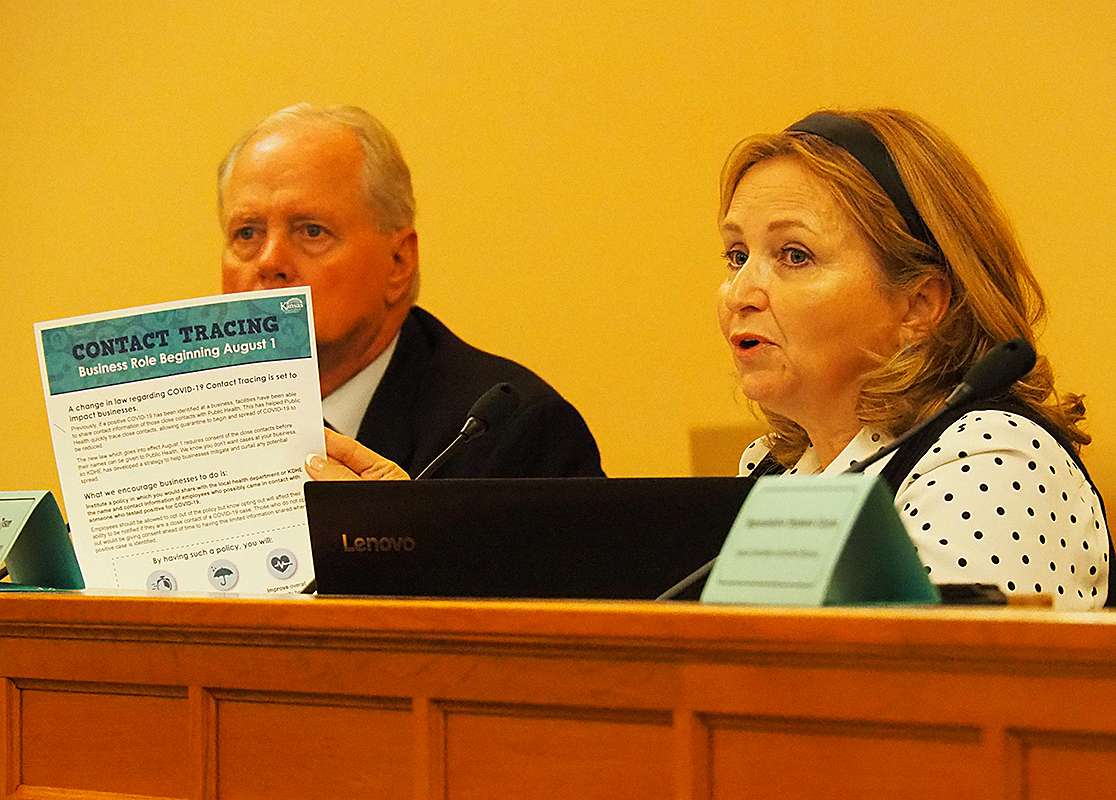
By TIM CARPENTER
Kansas Reflector
TOPEKA — Sen. Caryn Tyson pointed in despair at a one-page flier encouraging Kansans to grant prior approval to their employers so names and telephone numbers of workers thought to have been in close contact with someone infected by COVID-19 could be quickly shared with public health officials.
Tyson, a Republican from Parker in eastern Kansas, said she was frustrated by a notice distributed by the Kansas Department of Health and Environment that implied businesses were still compelled to take part in tracking suspected COVID-19 cases.
A bill passed by the Republican-led Kansas Legislature and signed into law by Democratic Gov. Laura Kelly in June made participation in contact tracing voluntary statewide. The law said business owners had no obligation to work with county or state health officials to collect information on customers or employees to bolster the reach of contact tracers.
“If the average person read your handout they would think that it was a requirement on a business,” Tyson said during a joint House and Senate committee hearing involving a KDHE epidemiologist. “If that is your interpretation of state law, I guarantee there’s going to be major push back.”
Farah Ahmed, the state epidemiologist and a member of KDHE’s staff, said there was no state law ordering companies or individuals to engage in contact tracing. She said the agency’s intent was to encourage businesses and health departments to work together to “get the job done.”
Attorney General Derek Schmidt recommended the Legislature make use of a one-day special session to adopt a sweeping bill to establish that health officers couldn’t compel a business or individual to take part in contact tracing. His sentiment followed a lawsuit in Linn County that put an end to a county order mandating businesses keep a log of customer names and telephone numbers.
He said the unregulated nature of contact tracing during the pandemic left Kansans concerned about the procedure and about how collected information could be used. The statute took effect Aug. 1.
“With this new statute,” Schmidt said, “Kansas will put in place enforceable statutory protections specifically to protect citizens’ privacy and civil liberties during COVID-19 contact tracing.”
Ahmed said contact tracing was the long-established method of gathering insight into who may be exposed so those people could be advised to take appropriate actions. Cooperation of businesses, especially large employers, is helpful in dealing with virus clusters, she said.
“Contact tracing along with appropriately putting people into isolation and quarantine is some of the most basic and strongest tools that public health has to control spread of disease,” Ahmed said.
As of Wednesday, KDHE said the state recorded 32,547 positive tests for COVID-19 since the first known case in March. That was an increase of 817 from Monday, the agency said. The number of fatalities linked to coronavirus in Kansas stood at 395 on Wednesday, an increase of eight from two days before. Nearly 2,000 people have been hospitalized with COVID-19 in a five-month period.
Sen. Gene Suellentrop, a Wichita Republican, said KDHE should begin compiling statistics that make a distinction between the number of people who died of COVID-19 and the number who passed away from a medical condition aggravated to some degree by coronavirus.
Ahmed, the KDHE epidemiologist, said the state reported regularly on COVID-19 fatalities by race, age and gender but not in association with the simultaneous presence of more than one chronic disease or condition in a patient.
“We all know people in the medical industry that have told us that individuals did not die of COVID-19, but they are being counted as such,” said Tyson, echoing Suellentrop’s uncertainty about the death toll. “The data he asked for is absolutely critical in order to get an accurate picture.”
Tim Carpenter has reported on Kansas for 35 years. He covered the Capitol for 16 years at the Topeka Capital-Journal and previously worked for the Lawrence Journal-World and United Press International.



